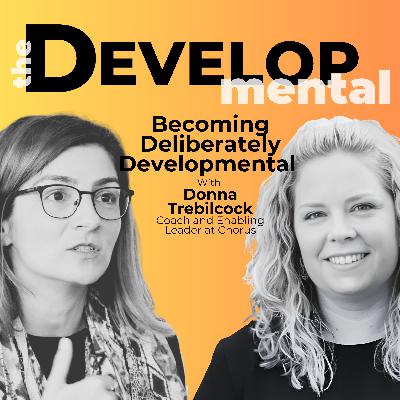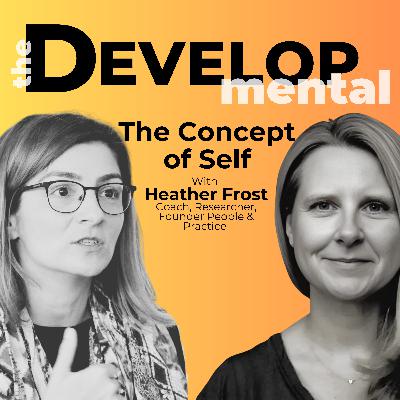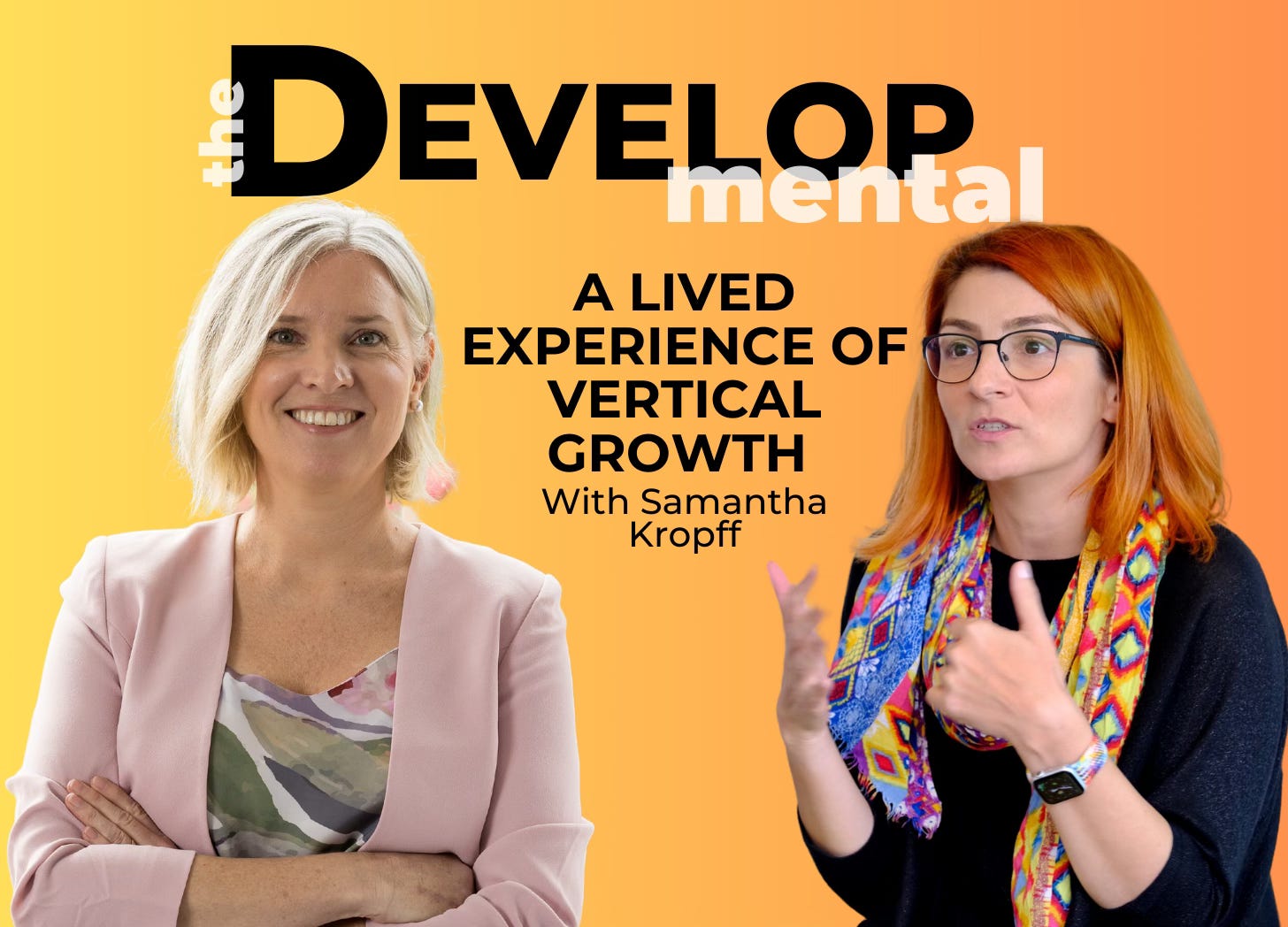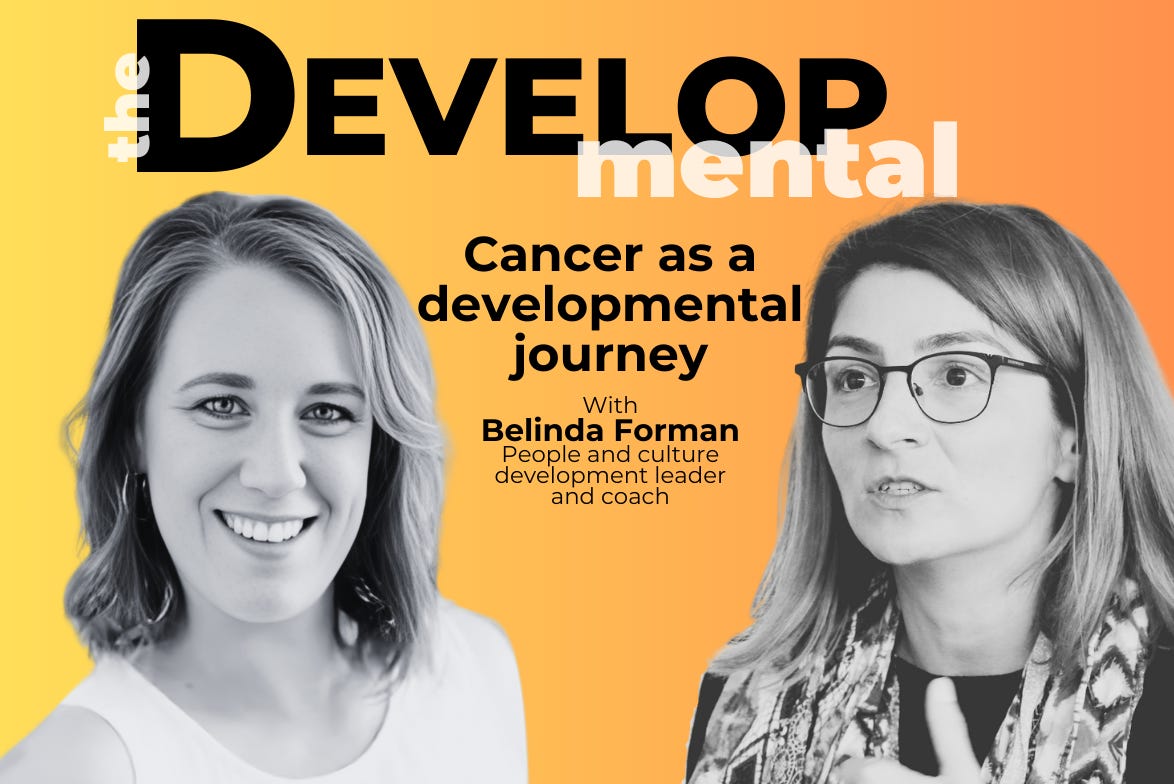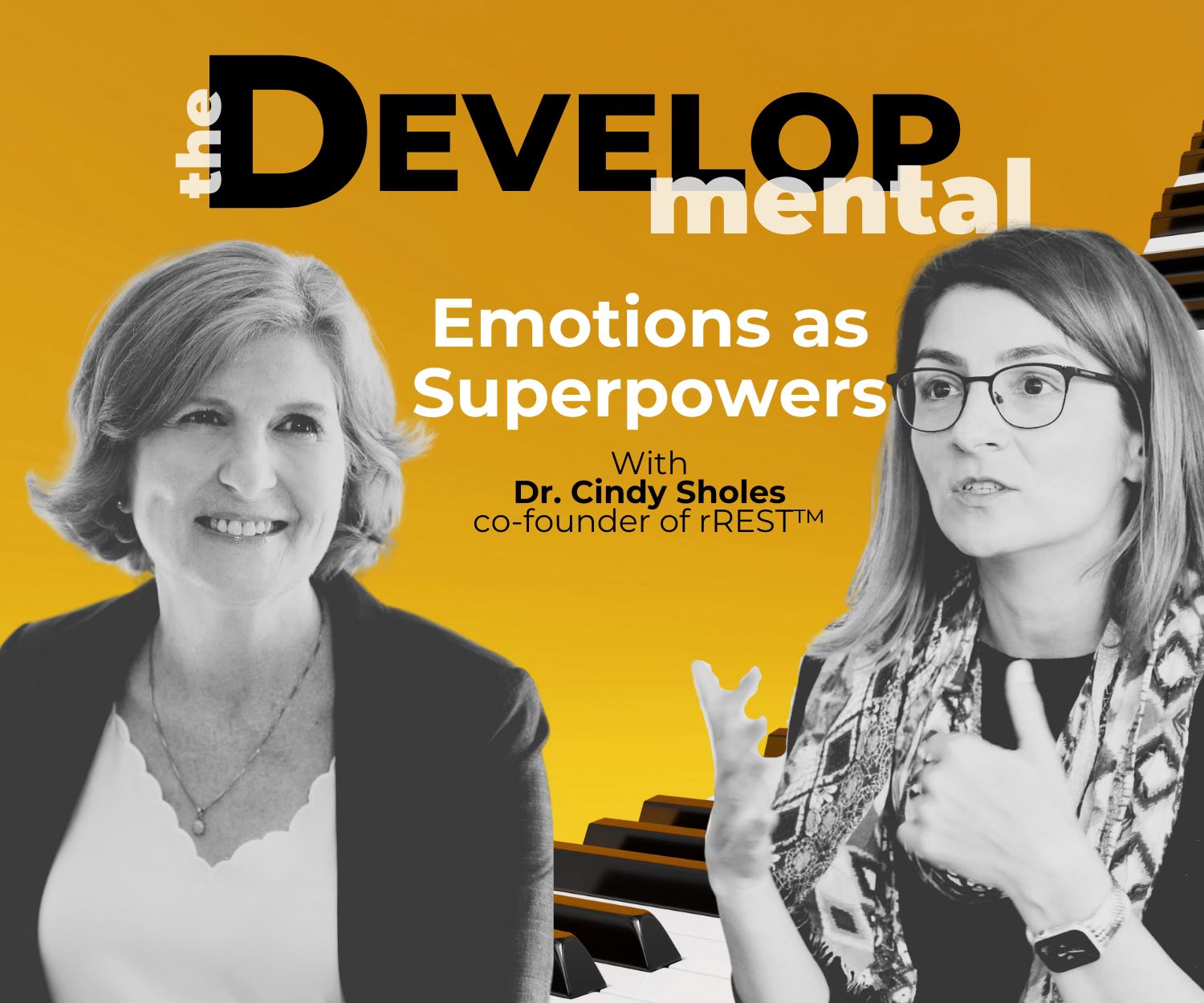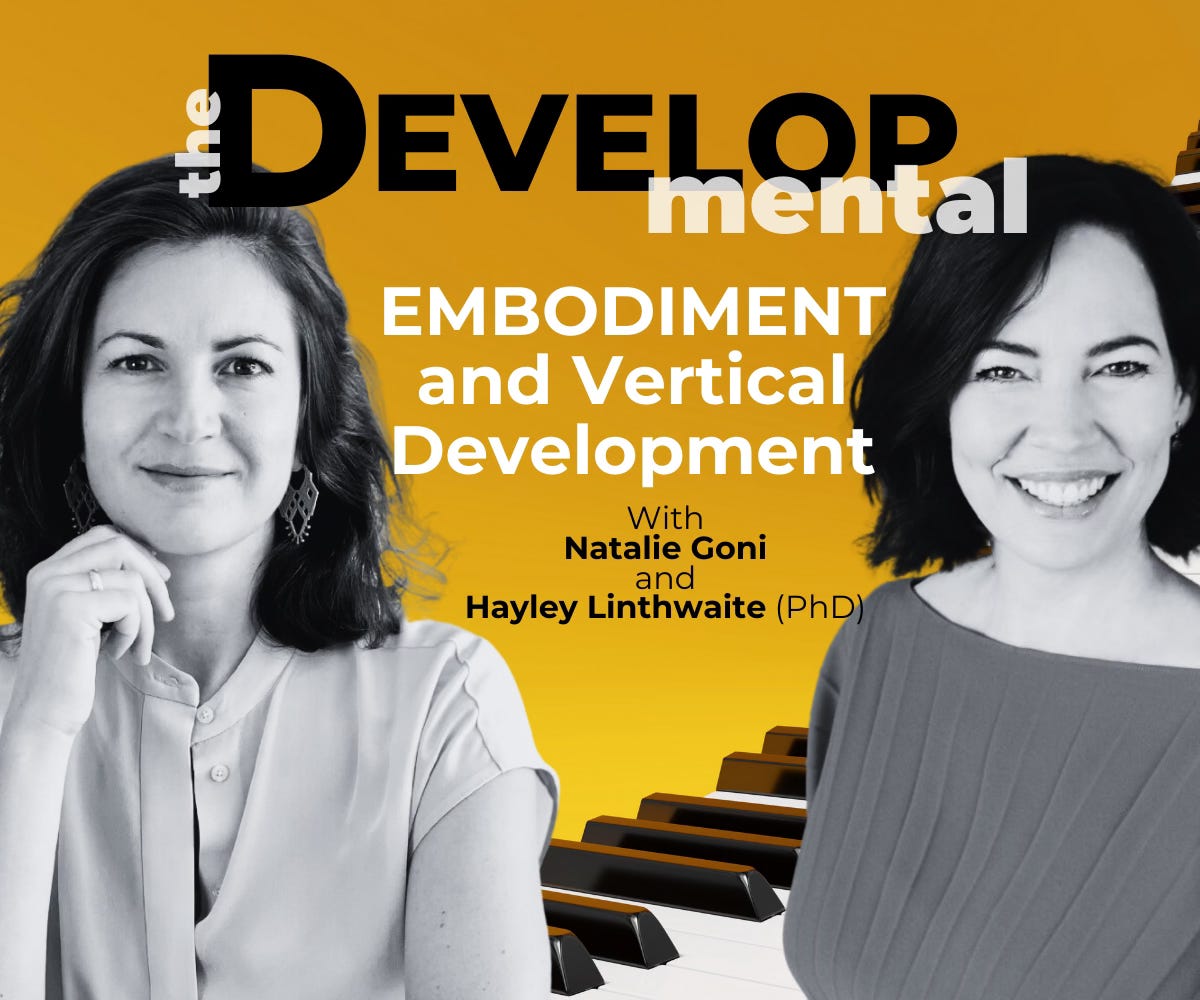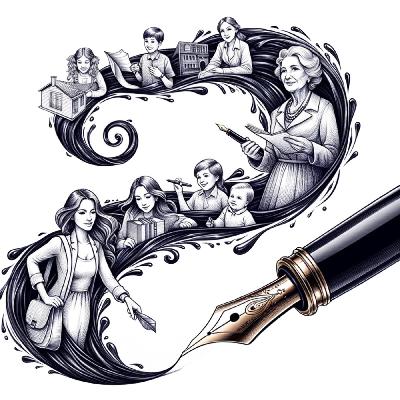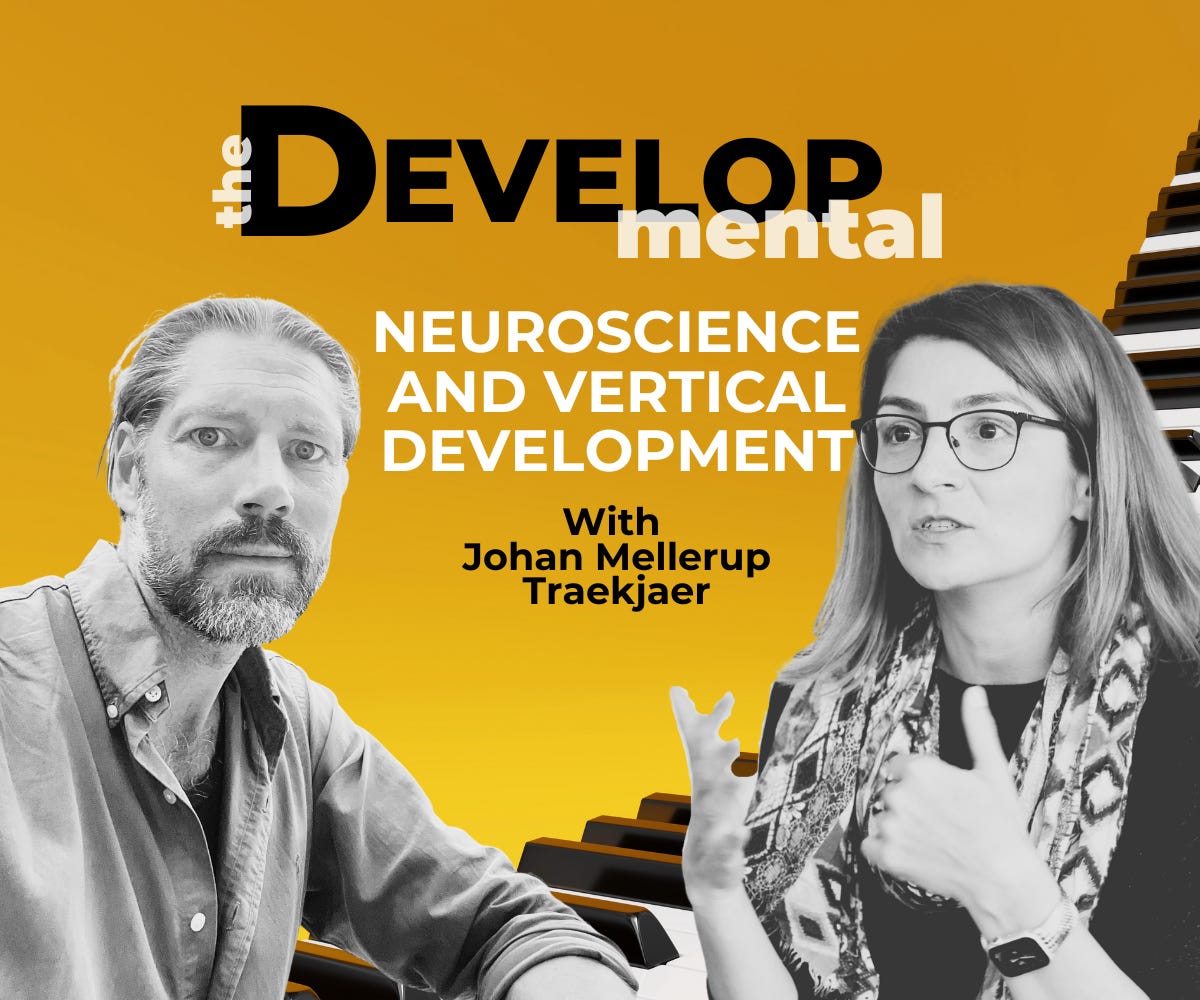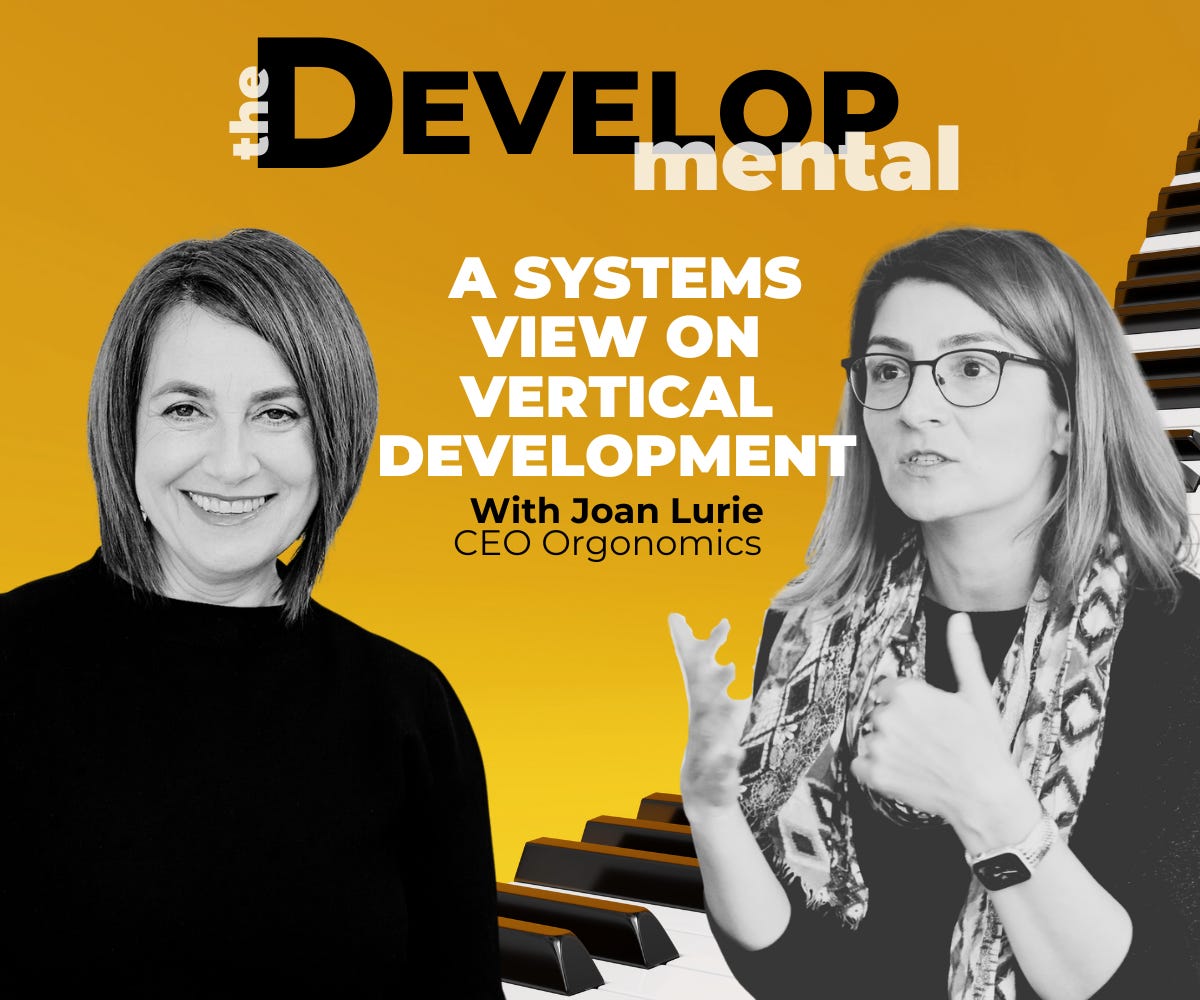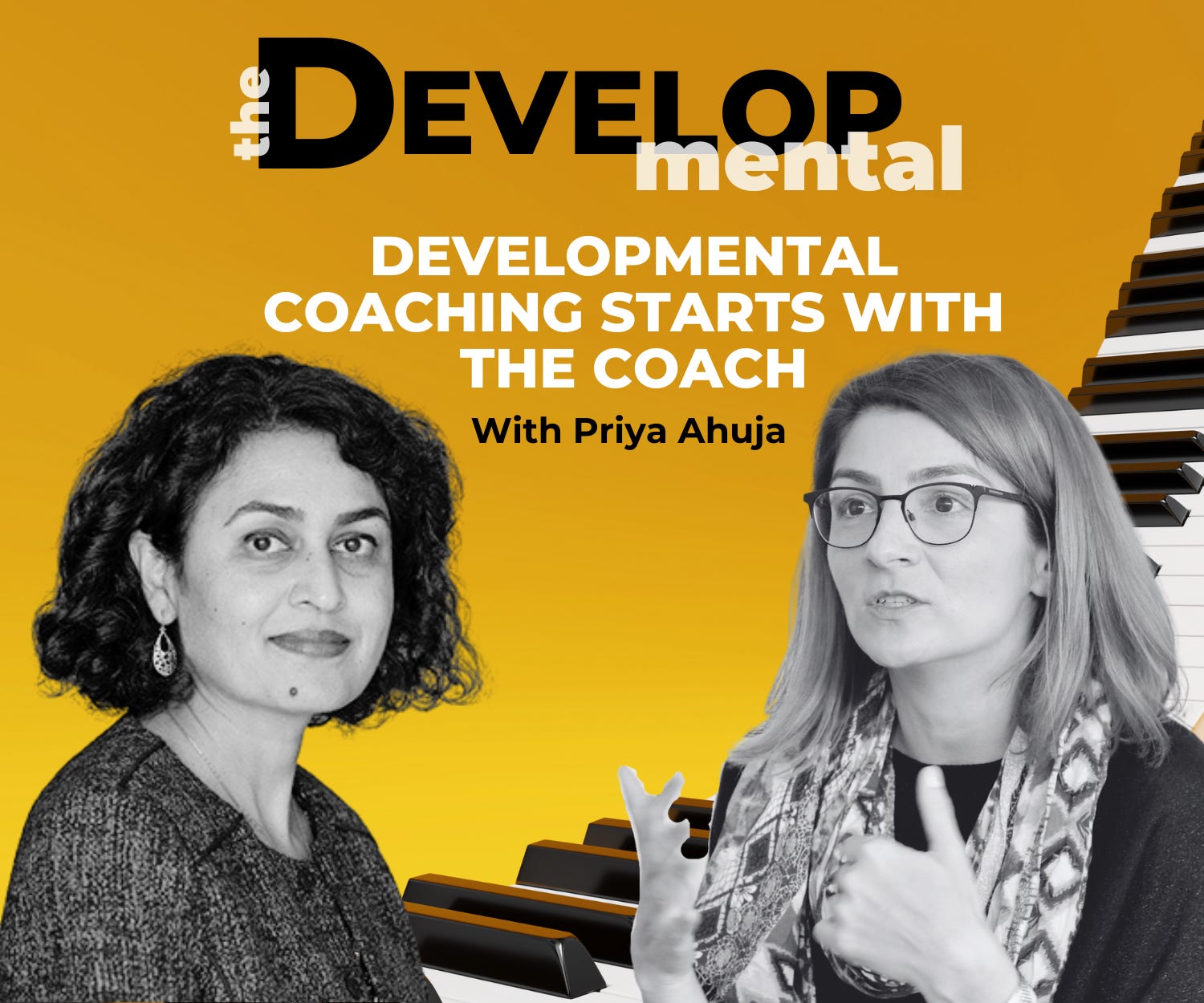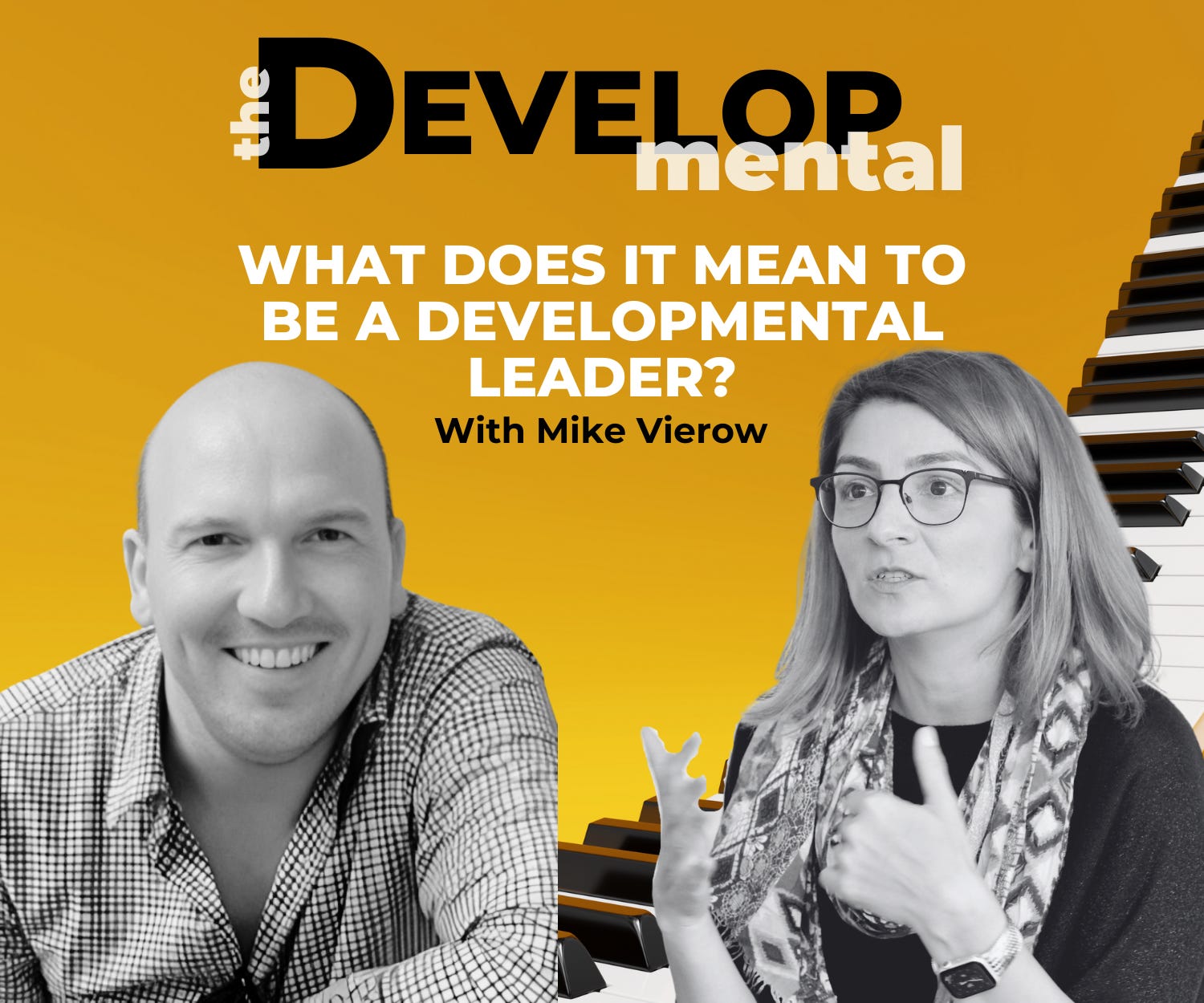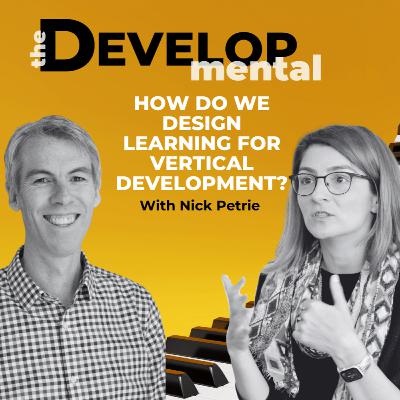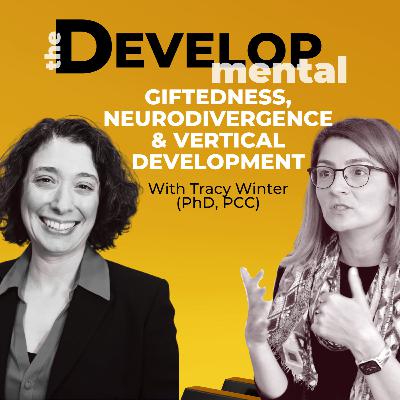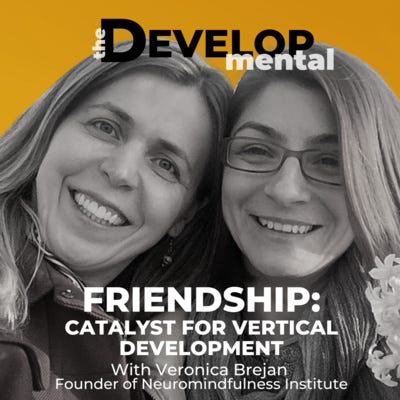Discover The Developmental
The Developmental

The Developmental
Author: Alis Anagnostakis (Ph.D.)
Subscribed: 19Played: 219Subscribe
Share
©Alis Anagnostakis Ph.D.
Description
A podcast about the messy, beautiful ways grown-ups grow up. Leaders, learning experts and developmental researchers come together to explore turning science into the day-to-day practice of adult development in teams, homes, organisations, and life.
Dr Alis Anagnostakis is an adult development researcher, group learning facilitator and founder of the Vertical Development Institute. Her highest hope as a researcher-practitioner is to help support the growth of conscious, mature and future-fit leaders and to bring the tools of vertical development into day-to-day to day life.
www.verticaldevelopment.education
Dr Alis Anagnostakis is an adult development researcher, group learning facilitator and founder of the Vertical Development Institute. Her highest hope as a researcher-practitioner is to help support the growth of conscious, mature and future-fit leaders and to bring the tools of vertical development into day-to-day to day life.
www.verticaldevelopment.education
22 Episodes
Reverse
In this episode of The Developmental, I’m in conversation with fellow Substacker, Dr. Nathalie Martinek, an independent researcher and facilitator whose story and work brings new clarity to the messy business of human growth. We explore how narcissism, and the shadow of shame that often goes with it, can be reframed not as a clinical label, but as a relational pattern that we each play a part in.Nathalie takes us from her time as a researcher in cancer biology labs to her own mirror moment: discovering how people (including herself) can behave like cancerous cells within toxic organisational cultures. In this episode, she shares:A vivid reframing of narcissism as something we all carry in relationship dynamicsA powerful three‑fold shame framework for navigating inner resistance when we set boundariesPractical tools—from narrative reframing to the Drama Triangle—to support courageous and relationally healthy leadershipI hope this conversation encourages you to lean into your own developmental edge, helps you discover new pathways to model what you teach and walk the talk as leaders, becoming, as Nathalie beautifully says, an antidote to relational toxicity.Episode Highlights:00:00 – Welcome & IntroAlis introduces Nathalie and sets the scene for a deep dive into shame, narcissism, and walking the talk in leadership and facilitation.04:20 – From Cancer Biology to Human SystemsNathalie shares how her early science career in cancer research led her to study dysfunctional human systems and relational toxicity.12:05 – Becoming the Cancer CellA raw reflection on recognising her own toxic behaviours within toxic systems—and the wake-up call that led to change.19:15 – Spiritual Awakening & Finding a New PathThe messy, long road from burnout to learning reflective practice, spiritual healing, and group facilitation.26:40 – Walking the TalkNathalie explains how the Family Partnership Model demands facilitators model what they teach—and how she learned to embody it.34:15 – What Not Walking the Talk Looks LikeReal examples from facilitation settings—when leaders perform care but undermine psychological safety.42:50 – Moral Courage in FacilitationWhat to do when the person with the most power in the room (the leader) is also part of the problem.49:10 – Hacking Your Own NarcissismNathalie redefines narcissism as a relational pattern, not a pathology, and invites facilitators (and leaders) to examine their power and need for control.55:50 – Three Types of ShameNathalie introduces her brilliant framework:Shame 1: Breaking rules you didn’t know existed.Shame 2: Violating your own values to conform.Shame 3: Feeling guilt after setting healthy boundaries.1:09:10 – Good Person Syndrome & Boundary GuiltExploring the tension between being a “good person” and choosing self-alignment over others’ comfort.1:16:35 – Practical Tools for Working with ShameFrom reframing narratives to breathing exercises and working with Karpman’s Drama Triangle as a reflection tool.1:23:00 – Final ReflectionsWhy increasing our tolerance to shame might be one of the most powerful levers for individual and collective transformation.Guest Bio: Dr. Nathalie MartinekNathalie Martinek, PhD, helps people build relational leadership capacity and cultivate effective relationships in professional life, while also supporting those who’ve been scapegoated, sidelined, or harmed in environments that protect image over people. As a coach, she works with professionals to shift unhelpful relational patterns and navigate subtle power dynamics. As a group facilitator, she creates spaces for learning, applied reflection, and restoration. As a consultant, she helps individuals make sense of workplace dysfunction and emerge intact, with insight into the system and how to move forward. Her approach draws on years of practice inside and alongside institutions, informed by an early career in developmental biology and cancer research, where she studied how environments shape behaviour and how systems enable dysfunction. Nathalie writes and teaches on scapegoating, narcissistic systems, relational leadership, and the emotional forces that shape them. She is the author of The Little Book of Assertiveness, The Scapegoating Playbook at Work, and creator of Hacking Narcissism on Substack. Get full access to Vertical Development: How Grown-ups Grow Up at www.verticaldevelopment.education/subscribe
Welcome to a soulful, candid conversation with experienced coach Donna Trebilcock who is, without a doubt, one of the wisest and most passionate people leaders I have ever met, working in service of a one-of-a-kind brave, norm-bending organisation: Chorus. Together, we explore how deliberately developmental principles are being put into practice within Chorus — through redefining leadership, cultivating collective responsibility, and fostering environments where people can grow into their next developmental edge, but also Donna’s own journey or vertical development and the way it has enabled her to hold space for others’ growth. Donna invites us to a space where raw vulnerability is balanced with practical insights, offering a window into what it really takes to build a developmental organization while becoming a developmental person.If you are in any shape and form involved in leading people or leading people functions, or perhaps coaching or facilitating the growth of people in work contexts, this episode is not to be missed.Episode Summary* [00:00:00] Introduction to Donna Trebilcock* Donna’s background and coaching approach.* Introduction to Chorus as a self-managing, purpose-driven organization.* [00:03:00] The Reality of Developmental Work* How personal and organisational growth journeys are intertwined* [00:10:00] Identity and Developmental Transition* The inner struggle: “Who am I if I’m not indispensable?”* Donna’s transition from Achiever to Redefining and coaching as a turning point. * [00:18:00] The Role of Experimentation in Developmental Leadership* Concrete team-level experiments (e.g., peer feedback in meetings).* Removing top-down control creates empowered, engaged teams.* [00:23:00] Inside the Chorus Experiment* Chorus’ unique model: flat, no hierarchy, no job titles.* Internal coaching evolving from performance focus to deep developmental work.* [00:28:00] Leading Without Authority* Challenges of influence without power.* Coaching as key to growing leadership capacity at all levels.* [00:31:00] Democratizing Power and Accountability* Playbooks co-created by staff.* Agreement-making frameworks that anticipate and hold conflict.* [00:35:00] Impact and Outcomes* Increased engagement, innovation, autonomy.* Vertical development becoming core to the culture.* [00:38:00] Growth Labs and Organizational Learning* Development becoming embedded across onboarding, meetings, and eventually recruitment.* Creating local autonomy and minimizing centralized enabling functions.* [00:43:00] The Messiness of Developmental Work* Dealing with legacy structures and culture.* Compassion and patience as foundational mindsets.* [00:48:00] When Empowerment Pushes Back* Confronting the discomfort of power being questioned.* Walking the talk as a leadership team, even when it’s hard.* [00:51:00] Slowing Down to Speed Up* Developmental debriefs in high-pressure times.* Counterintuitive moves to nurture sustainable growth.* [00:55:00] Donna’s Advice to Her Earlier Self* Expect and embrace the mess.* Compassion for self and others is essential fuel.* [00:59:00] Hope and the Ripple Effect* Recognising human potential and the messy, gritty, real work of making the world better.Guest Bio: Donna TrebilcockDonna is a certified Executive, Organisational, and Systems Coach specialising in leadership and team development through a vertical (adult development) lens. She supports leaders and teams to grow in complexity, strengthen relationships, and navigate meaningful change — especially in progressive, self-managing, or values-led organisations.With deep experience coaching individuals and teams at all levels, she brings a grounded, developmental approach to building high-performing, purpose-driven cultures. She works in close partnership with clients to co-create coaching engagements that meet them where they are and support their most important goals.Donna’s practice is shaped by ongoing professional development and lived experience in complex, adaptive organisational systems. She is passionate about the real work of leadership — cultivating the inner capacity to lead amidst uncertainty, build trust, and grow collective intelligence.Key qualifications and tools Donna brings to coaching partnerships include: • Certified in Executive, Organisational and Relationship Systems Coaching • Leadership Maturity Profile (LMP) accredited • Leadership Circle Profile (LCP) 360-degree accredited • ORSC (Organisation & Relationship Systems Coaching) trained • NLP Practitioner • CILCA360 accredited • Shifting Horizons Advanced Practitioner Certified • Expert workshop design and facilitation (from small teams to whole systems) • Experienced in large-scale transformation and public sector environmentsDive deeperI hope you’ve enjoyed this podcast. If you are curious to dive more deeply into learning about Vertical Development and how it might impact your work and life, check out our online library of webinars and courses accredited by the International Coaching Federation. If you choose to become a paid subscriber to this substack you will receive complimentary access to all our webinars and 50% discount on our long-form online programs. Spread the word…If you want to bring your bit to building a wiser, more conscious world, I hope you share this article with others who could benefit from the learning.and, if you haven’t done it yet, Subscribe!Join your nerdy community and let’s keep on staying curious and learning from each other Get full access to Vertical Development: How Grown-ups Grow Up at www.verticaldevelopment.education/subscribe
For this episode, I sat down with researcher, coach, and lifelong explorer Heather Frost to dive into her fascinating work on the concept of self. From global travel to coaching, psychology and philosophy, Heather shares how her journey led her to ask one of life’s most fundamental questions: What is the Self? Together, we unpack the difference between self-concept and the Concept of Self, explore how different understandings of self shape behaviour and identity, and consider what this all means for coaching, adult development, and how we relate to each other. I hope you leave this conversation with a new perspective on yourself and with renewed curiosity about the complexity and beauty of our minds.Episode Summary00:00 – 05:30 | Origins of the Inquiry into SelfHeather’s lifelong curiosity about how people make sense of themselves, shaped by travel, philosophy, coaching, and neuroscience.05:30 – 10:30 | Embracing UncertaintyImmersive travel as a practice of “not knowing” — cultivating openness, resilience, and a fluid sense of self.10:30 – 15:30 | How Not-Knowing Changes UsAlis and Heather explore how dislocation and risk can deepen self-awareness and transform identity.15:30 – 23:00 | Kindness, Openness, and HumilityExposure to difference builds compassion and dissolves rigid identity boundaries.23:00 – 31:00 | Defining Terms: Self-Concept vs. Concept of SelfClear distinction:* Self-concept = beliefs about who I am* Concept of self = what I think the “self” is31:00 – 39:00 | The 3 Spectrums of SelfHeather’s research reveals three key dimensions:* Stability – Is self constant or evolving?* Unity vs. Multiplicity – One self or many?* Thoughts-as-Self vs. Thoughts-as-Patterns39:00 – 44:30 | Why This Matters in CoachingThe Concept of Self influences agency, decision-making, and behaviour change. Coaches must listen for clues in the client's language.44:30 – 54:00 | Adapting Coaching ApproachesTailor your methods: future visualisation works for stable self-views; emergent experiments work better for fluid self-views.54:00 – 1:01:00 | Reframing Limiting BeliefsNo “right” way to view the self — ask: Does this belief serve the client in their context?1:01:00 – 1:08:00 | Links to Adult DevelopmentLater developmental stages often correlate with fluid, multi-part understandings of self — but nuance and fit matter more than hierarchy.1:08:00 – 1:13:00 | Practice for CoachesReflect on your own concept of self. Tune into how your clients relate to Self — and coach accordingly.1:13:00 – End | Final ReflectionsHeather’s hope: deeper awareness of how we understand “self” can foster more compassionate, skillful coaching — and a more tolerant world.Guest Bio: Heather FrostHeather is the Founder and Director of People and Practice, Co-founder of Think Perspective and Visiting Tutor at Henley Business School. She has over 20 years of experience of experience in behaviour change; coaching, mentoring, training, and consulting to clients including Deloitte, Oxentia, Accenture and Kantar. Deeply driven to understand different cultures and the systems that influence behaviour, Heather has lived as a resident in four countries and travelled extensively to over forty countries. Her commercial work with organisations, executives, leaders, and teams incorporates her global experience and expertise in culture change, business transformation, learning and development, organisational development, leadership development, and systemic change.Heather holds a Bachelor’s degree in Psychology (BPsych) with a minor in Philosophy, a Master of Science in Coaching & Behavioural Change (MSc) and is currently a Doctoral Researcher (PhD) in Leadership, Organisations and Behaviour at Henley Business School. Heather won a fully funded scholarship through the Henley Business School flagship "World of Work" award. Heather's research and coaching focuses on the link between self-awareness, meta-cognition, consciousness, sense of agency, quality of thought, beliefs, culture, purpose, and behaviour: ultimately how individuals "act" and behave. Her newly developed psychological scale which measures the Concept-of-Self, upcoming published work, writing, and training helps coaches understand how their “self” and the self of their client’s manifest and interact. Her research explores practitioner self-deception, bias and self-delusion, the self-as-instrument, mindfulness, neuroscience and meaning in life.Heather is a certified Lumina Learning Practitioner, an accredited coach with the International Coaching Federation (ACC) and a Senior Practitioner with the European Mentoring & Coaching Council (EMCC). She holds the following certifications from INSEAD: Leading Organisations in Disruptive Times, Innovation in the Age of Disruption, Strategy in the Age of Digital Disruption and Leading in a Transforming World. She is a Certified Six Sigma Green Belt from PMI (CSSGB). Heather is also an Advanced Practitioner of Breakthrough Coaching (WBECS/coaching.com) and a Visiting Tutor at Henley Business School teaching the triple-accredited Professional Certificate of Executive Coaching (PCEC).Dive deeperI hope you’ve enjoyed this podcast. If you are curious to dive more deeply into learning about Vertical Development and how it might impact your work and life, check out our online library of webinars and courses accredited by the International Coaching Federation. If you choose to become a paid subscriber to this substack you will receive complimentary access to all our webinars and 50% discount on our long-form online programs. Also, until the 30th of March, we offer our ICF-accredited certification program - “Vertical Development Practices for Coaches” at 30% discount.Spread the word…If you want to bring your bit to building a wiser, more conscious world, I hope you share this article with others who could benefit from the learning.and, if you haven’t done it yet, Subscribe!Join your nerdy community and let’s keep on staying curious and learning from each other Get full access to Vertical Development: How Grown-ups Grow Up at www.verticaldevelopment.education/subscribe
Through my work, I have been immensely lucky to meet some exceptional humans who have inspired me, taught me precious lessons of wisdom and even offered me the most precious gift of all: their friendship. This episode features one of these remarkable people: Samantha Kropff. Sam shares with us her journey from being a forensic investigator to becoming a leader and later a leadership development expert and the accompanying transformation she experienced in her work and life. She vulnerably shares the ups and downs of her growth - revelations, setbacks, hard-won lessons and the courageous choice to push herself out of her comfort zone again and again. Samantha is an inspiring example for every woman who has ever had to find her voice and step into her leadership power, especially when working in male-dominated environments. She is also an advocate for the value of vertical development as a life practice, showing us how incredibly beautiful and painfully messy the journey of human growth can actually be. Episode Summary: * [00:05:30] Sam’s Background: Sam’s career and personal journey towards vertical development.* [00:15:45] Redefining vs. Transforming: Differences between the lived experience of Redefining and Transforming. See this previous episode of The Developmental for an overview of the stages of development. * [00:25:00] Sam’s Career Change and Identity Shift * [00:35:00] Relationship with Time: Evolving from a linear to a flexible perspective on time.* [00:45:15] Integrating Shadow Aspects: Importance of integrating shadow aspects in personal growth.* [00:55:00] Organizational Change Challenges: Challenges in pushing for change as the chair of a culture reform committee.* [01:05:00] The Role of Discomfort in Growth: Discomfort as a catalyst for vertical development.* [01:14:00] Closing Thoughts: Final reflections on vertical growth's impact on individuals and organizations.Guest Bio: Samantha KropffSamantha Kropff is a Manager of Leadership Development in NSW Government and also a leadership coach. Samantha has spent her career working in government organisations both in Leadership Development and also as a technical specialist. Samantha is an experienced executive coach, having coached senior police leaders both across Australia as well as 8 international police agencies over the past 4 years.Samantha started her career as a Forensic Investigator working both nationally and internationally on commonwealth police investigations. Working to dismantle global organised criminal syndicates and also helping Australian citizens or those overseas during times of crisis, such as Timor-Leste to help during civil unrest, deploying to Netherlands to assist with the investigation of the downing of MH17, or deploying interstate to help with fatal bushfires.Samantha transitioned from investigating crime to using her investigative skills to explore what influences leadership behaviours, and how to support leaders to grow and development, not just as a leader but as a human being. She can see the exponential impact leaders can have on others and organisations, and it is her passion to find ways to support current and aspiring leaders to be the best versions of themselves.Samantha works with vertical leadership development in her coaching practice and as a leader herself. She is a living example of applying the tool to herself for her own growth and works with leaders who want to do the same. She is especially passionate about supporting female leaders to let go of the conditioning that keeps them small and support them to feel safe to be seen and reach more of their leadership potential.You can read more about Sam’s work on her website: https://www.skleadership.com.auDive deeperI hope you’ve enjoyed this podcast. If you are curious to dive more deeply into learning about Vertical Development and how it might impact your work and life, check out our online library of webinars and courses accredited by the International Coaching Federation.Spread the word…If you want to bring your bit to building a wiser, more conscious world, I hope you share this article with others who could benefit from the learning.and, if you haven’t done it yet, Subscribe!Join your nerdy community and let’s keep on staying curious and learning from each other. Get full access to Vertical Development: How Grown-ups Grow Up at www.verticaldevelopment.education/subscribe
In this emotional conversation, I sit down with my dear friend, Belinda Forman, who shares her profound journey with cancer, not just as a battle to be fought, but as a deeply personal developmental journey. Belinda opens up about the initial shock of diagnosis, the rollercoaster of choices around treatments, and the unexpected pathways to personal growth that emerged from her experience. Through her story she invites us into a vulnerable exploration of the intersection of health crises and adult development, shedding light on the power of mindset, the importance of facing our mortality, and showing us how we might choose to lean into adversity as a gift of transformative growth. I hope you are as inspired as I was by Belinda’s insights into navigating one of life's toughest challenges with grace, ‘fire’, awareness, resilience, and an open heart, and that you find in this conversation some precious wisdom to bring into your own relationship with adversity.Episode summary* [00:00:00] Kicking off with a deep dive into growing through health challenges.* [00:03:11] Belinda opens up about her cancer journey and finding growth amidst adversity.* [00:09:58] She touches on the raw deal of facing mortality and the growth it spurred.* [00:12:18] Talks about how her views on control and acceptance were turned upside down.* [00:18:14] Highlights how a positive mindset and seeing cancer as part of her story helped her heal.* [00:35:01] Belinda reflects on the continuous journey of self-discovery and supporting oneself post-crisis.Useful Resources* Belinda’s LinkedIn profile: https://www.linkedin.com/in/belindaforman/ * The meditation Belinda mentions she has found hepful and healing:* Insight timer - another great app for meditation Belinda recommends: https://insig.ht/j0c3vaJoNGb* Bowel cancer AU - www.bowelcanceraustralia.org* Learn more about colon cancer: Coloncancerfoundation.orgGuest Bio: Belinda FormanBelinda Forman is a seasoned People and Culture professional with a diverse background in coaching, L&D, team experience, and culture development. Based on the Sunshine Coast in Australia, Belinda has a passion for helping individuals connect with their purpose and values, empowering them to lead more powerful and fulfilling lives.Belinda and her husband Matt have spent the last 15 years building and growing business in the tech space. Creating environments where individuals thrive both personally and professionally.Dive deeperI hope you’ve enjoyed this podcast. If you are curious to dive more deeply into learning about Vertical Development and how it might impact your work and life, check out our online library of webinars and courses accredited by the International Coaching Federation.Spread the word…If you want to bring your bit to building a wiser, more conscious world, I hope you share this article with others who could benefit from the learning.and, if you haven’t done it yet, Subscribe!Join your nerdy community and let’s keep on staying curious and learning from each other. Get full access to Vertical Development: How Grown-ups Grow Up at www.verticaldevelopment.education/subscribe
In this episode we dive into the rollercoaster of emotions and how they secretly power our lives. I’m thrilled to learn from Dr. Cindy Sholes, a neuroscientist, coach and co-founder of the rREST™ technique, as we explore "Emotions as Superpowers." In this chat, Cindy takes us on her personal journey, from the foundational experiences of her early years to her research into neuroscience and her journey into the heart of human emotion. She sheds light on the mysteries of emotional agility and introduces us to the rREST technique – her unique approach to taming emotional stress. We'll explore how our feelings are not just fleeting reactions, but powerful guides that shape who we are and how we navigate the world - how we parent, engage with our life-partners and show up for others (and ourselves) every day. So, grab a cozy spot and join us for a conversation that I hope will be as enlightening as it is heartwarming. We're not just talking about emotions – we're aiming to discover how they can be our greatest superpowers in this crazy, beautiful and yet often overwhelming journey of life.Episode summary[00:02:33] Dr. Cindy shares her neuroscience background and personal experiences.[00:06:08] Journey from neuroscience to studying emotions and the subconscious.[00:09:51] Discussion on emotional triggers and the importance of emotional understanding.[00:17:20] Explanation of emotional agility in adult development.[00:23:35] Introduction to the rRest technique for managing emotional stress.[00:33:15] Four reflective questions for better emotional understanding.[00:41:21] How emotions manifest physically and impact behavior.[00:51:14] Curiosity as an effective tool for soothing emotions.[00:56:49] Importance of practice and awareness in emotional regulation.[00:59:44] Dr. Cindy's vision for emotional mastery and authentic self-expression.[01:02:31] Summary of key insights and the role of curiosity in emotional growth.Useful Resources* Cindy’s website: https://www.drcindysholes.com * Learn more about the rREST™ method: https://rrestacademy.com* Shirzad Chamine’s work on Positive Intelligence (saboteurs/sage): www.PositiveIntelligence.com * The Emotional Guidance Scale source: the book "Ask and It is Given" by Ester and Jerry Hicks. * Dr. Brene Brown’s work on Emotions: the book “Atlas of the Heart” * Dr. Valerie Livesay’s work on Fallback: https://www.ghostlightleadership.com and the podcast I recorded with Valerie on this topic: * The Bodily Maps of Emotions research study: Nummenmaa L, Glerean E, Hari R, Hietanen JK. Bodily maps of emotions. Proc Natl Acad Sci U S A. 2014 Jan 14;111(2):646-51. doi: 10.1073/pnas.1321664111. Epub 2013 Dec 30. PMID: 24379370; PMCID: PMC3896150.* The Contrasting Emotions Theory by Dr. Alis Anagnostakis: https://www.researchgate.net/publication/363432753_Fostering_Conscious_Leadership_Exploring_Leaders'_Experience_of_Vertical_Development_during_an_Executive_Leadership_ProgramGuest Bio:Cynthia (Cindy) Sholes, PhDDr. Cindy has dedicated her life to supporting people who want to make a difference in the world by guiding them off of the burnout path dictated by society onto the purpose path assigned to them by their soul. Trained by Nobel Prize winners at UCSF, a prestigious medical school, Dr Cindy is a neuroscientist, who uses a little bit of magic to guide people to access their personal power and transform their future. She is the innovator and co-founder of rREST Inc. and was featured in the Wall Street Journal and USA Today for her 20 years of helping thousands break old emotional patterns to live full-hearted lives. She believes when you optimize brain function your authentic self will be freed and empowered to lead a purposeful life.Dive deeperI hope you’ve enjoyed this podcast. If you are curious to dive more deeply into learning about Vertical Development and how it might impact your work and life, check out our online library of webinars and courses accredited by the International Coaching Federation.Spread the word…If you want to bring your bit to building a wiser, more conscious world, I hope you share this article with others who could benefit from the learning.and, if you haven’t done it yet, Subscribe!Join your nerdy community and let’s keep on staying curious and learning from each other. Get full access to Vertical Development: How Grown-ups Grow Up at www.verticaldevelopment.education/subscribe
In the final episode of 'The Developmental' podcast for 2023, I explore a topic that has so far received very little attention - the role of the body in adult development. My guests, Natalie Goni and Hayley Linthwaite, are both pioneer practitioners at the intersection of vertical development and somatic practices and they bring a wealth of wisdom on the value of embodiment as a vehicle for personal growth. We explore what embodiment is (and what its opposite - disembodiment - feels like), the importance of understanding and befriending our body, the impact of ignoring physical discomfort, and the link between embodiment and leadership. We discuss the delicate topic of introducing somatic practices into leadership development programs and the untapped value for leaders and businesses. Natalie and Hayley both offer us the gift of two very different practices - so I’m encouraging you to listen to this episode in a private space where you might be able to get up, move or sit down, relax and close your eyes. Show summary01:01 Understanding Embodiment and Vertical Development01:47 Introducing the Guests: Natalie Goni and Haley Linthwaite05:52 Exploring the Journey to Embodiment11:26 Understanding Disembodiment16:41 Exploring the Concept of Embodiment19:36 The Role of Embodiment in Vertical Development33:10 Overcoming Resistance to Embodiment in Organizations39:41 Rediscovering Joy Through Movement40:15 The Challenge of Breaking Free from Conditioning40:43 Exploring Dance and Movement in Different Contexts41:47 The Healing Power of Movement43:05 The Role of the Body in Leadership and Decision Making44:25 The Impact of Physical State on Leadership47:16 The Importance of Self-Regulation and Self-Awareness50:48 The Connection Between Body and Mind in Decision Making51:51 The Role of Intention in Leadership55:43 The Role of Embodiment in Vertical Development56:40 The Power of Embodiment in Leadership59:42 Practical Exercises for Embodiment - Hayley and Natalie’s guided experiments01:17:03 The Importance of Presence and Aliveness01:20:22 Closing Thoughts and Future PlansUseful ResourcesHayley’s website: https://hayleylinthwaite.comNatalie’s website: https://nataliegoni.comPeter Levine (trauma therapy through somatic experiencing): https://www.somaticexperiencing.com/about-peter Bessel van der Kolk (neuroscience and trauma): https://www.besselvanderkolk.com 360 Emergence (transformation through movement): https://the360emergence.comLindsay Braman (visual art, mental health, emotional regulation): https://lindsaybraman.comGuests’ Bios:Hayley LinthwaiteFor over 30 years, Hayley has made it her life’s work to ignite the sparks of transformative change all over the world. An experienced facilitator, coach, consultant, social entrepreneur and educator, she has empowered countless leaders and teams, facilitated multimillion-dollar organisational change programs, founded social enterprises, and cultivated a community of changemakers. She bridges the latest explorations in systems change, adult development and neuroscience with the transformative power of the arts and embodiment to unlock profound shifts in individuals and systems. All of her work is propelled by her unwavering belief in our human capacity to ignite change and create abundant futures.She holds a PhD in Transformational Change (Applied Performance), a Master of Creative Industries in Drama Teaching, a Graduate Bachelor of Education, and a Bachelor of Arts in Drama.Natalie GoniWith over a decade of developing talent and leaders at one of the world’s largest financial institutions and as an Executive Coach and Group Facilitator for the past seven years, Natalie has not only always worked in the field of growth and people development, but she is also an avid and continued explorer of her own development journey through the lenses of adult development, embodiment and our emotions.Based in Hong Kong, Natalie is grateful to work with leaders and individuals across Asia Pacific and all over the world. Natalie brings an interdisciplinary and very human approach to coaching leaders and teams, drawing upon leadership development, team dynamics and self-exploration practices with systemic and post-conventional meaning-making approaches that increase self-awareness, build emotional maturity, and stretch one’s capacity to think and feel in more complex and adaptive ways. She supports her clients through key leadership transitions to build new skills and new ways of being.Natalie is also a faculty member of Harthill.Dive deeperI hope you’ve enjoyed this podcast. If you are curious to dive more deeply into learning about Vertical Development and how it might impact your work and life, check out our online library of webinars and courses accredited by the International Coaching Federation.Spread the word…If you want to bring your bit to building a wiser, more conscious world, I hope you share this article with others who could benefit from the learning.and, if you haven’t done it yet, Subscribe!Join your nerdy community and let’s keep on staying curious and learning from each other. Get full access to Vertical Development: How Grown-ups Grow Up at www.verticaldevelopment.education/subscribe
Content warning. This episode contains references to mental illness and suicide, which may be emotionally confronting or triggering to some listeners. If you or someone you know is struggling, please reach out to a healthcare professional or call your local helpline. Episode summary:Kate Arms introduces us to the work of Polish psychologist and psychiatrist Kazimierz Dąbrowski, a brilliant developmentalist virtually unknown outside of the gifted and neurodivergent community, whose work centred on exploring how developmental growth unfolds through cycles of disintegration and re-integration. I talked with Kate about why such moments of disintegration are vital to our long-term growth and at the same time incredibly difficult to navigate. We also explore why coaches could benefit from an understanding of this psychological process and all the painful emotions that arise as we breakdown and then breakthrough. We explore how, as coaches, we might support our clients to navigate the messy spaces towards a wiser, more mature, more balanced self and how we might help ourselves do the same.00:00 Introduction and Welcoming Guest00:54 Exploring the Intersection of Fields01:32 The Role of Neurodivergence in Adult Development02:10 Discovering Dąbrowski’s Work and its Impact05:09 The Journey of Self-Discovery and Transformation10:15 Understanding the Concept of 'Twice Exceptional'11:48 The Power of Coaching in Personal Growth12:26 The Role of Emotions in Development17:04 Exploring Dabrowski's Theory of Positive Disintegration29:12 Understanding Developmental Potential and Overexcitabilities36:38 The Role of a Coach in Navigating Disintegration39:33 The Intersection of Coaching and Therapy47:16 The Impact of Developmental Theory on Personal GrowthAbout Kate Arms, JD, CPCC, PCCFor over 35 years, Kate has been studying the question of how to create social groups that thrive as communities while community members thrive as individuals. She has deep interests in human physiology and neurodiversity, the role of ritual and art in personal transformation, collective creativity, change management, and governance structures that support individual and collective evolution.Kate has been a professional coach for over a decade and has been mentoring and teaching coaching since 2016. From the very beginning, her coaching practice focused on coaching creators and innovators, twice-exceptional and profoundly gifted adults, and parents of twice-exceptional kids. Her current portfolio of work includes private coaching, teaching and guiding coaches at the Neurodiversity Coaching Academy, and organizational leadership development and Agile coaching.In all her work, she focuses on transformational culture-building and designing systems to support adaptive change that sticks.Her book, L.I.F.T.: A Coach Approach to Parenting, presents an approach to parenting that helps parents bring out the best in their family relationships as they help their children navigate the challenges of growing up in the modern world.She holds a BA in Theatre and Biopsychology from Cornell University and a JD from Harvard Law School. She is credentialed as an International Coach Federation PCC, a certified ICAgile Expert in Enterprise Coaching, and a Certified Professional Co-Active Coach. She is a graduate of the Co-Active Leadership Program. Useful resourcesMore about Dąbrowski’s work and a brilliant podcast hosted by Dr. Chris Wells: https://dabrowskicenter.org/podcast/An overview of overexcitabilities and why you need to be aware of them (especially if you are raising gifted kids or you were one yourself): https://www.verywellfamily.com/dabrowskis-overexcitabilities-in-gifted-children-1449118A wonderful book on overexcitabilities (addressed to gifted adults too): https://www.amazon.com.au/Living-Intensity-Understanding-Sensitivity-Excitability/dp/0910707898Kate Arms’ and Tracy Winter’s website for all coaches interested in neurodiversity: https://www.neurodiversitycoachingacademy.com/about/Kate’s book for parents seeking to integrate coaching into their relationship with children: https://www.amazon.com/L-I-F-T-Approach-Parenting-Kate-Arms/dp/1999430271ICF’s guidelines for referring clients to therapy: https://coachingfederation.org/app/uploads/2021/01/ReferringaClienttoTherapy.pdfDive deeperI hope you’ve enjoyed this podcast. If you are curious to dive more deeply into learning about Vertical Development and how it might impact your work and life, check out our online library of webinars and courses accredited by the International Coaching Federation.Spread the word…If you want to bring your bit to building a wiser, more conscious world, I hope you share this article with others who could benefit from the learning.and, if you haven’t done it yet, Subscribe!Join your nerdy community and let’s keep on staying curious and learning from each-other. Get full access to Vertical Development: How Grown-ups Grow Up at www.verticaldevelopment.education/subscribe
You can listen to an audio version of this article by clicking the ‘play’ button in the Substack app or, if you’re reading this on your email, click ‘play’ in the voiceover section above. Please let me know in the comments if this audio feature is useful to you and if you think it’s worth adding the audio to every article going forward. Saturday, 20th of February 1999. 11pm“I have long worried that if I were to lay down my thoughts in the pages of a journal that would give anyone a gateway into my most intimate musings, and I was afraid to risk it. Until now… I do believe that writing will give my future self an opportunity to go back in time, to re-live the past, to understand it not just with the mind of my future self, but through the eyes of my present self. Perhaps time will make my memories fade and my grown up self will look back on my teenage years with a completely different perception than my own right now. I’m hoping this journal, which I am starting tonight, will help me better understand my own children when they get to the age I am now. Perhaps it will help future me bridge the ‘generation gap’ …”This is the first entry in my first-ever journal. I started it when I was 16. My worry that my parents would read it was smaller than my worry that unless I did write, I would forever lose the memory of my teenage self and, with it, the proof that I had looked at the world in ways that seemed incomprehensible to the grown-ups around me at the time. Through my eyes, adults seemed to be afflicted with a strange sort of amnesia, that had erased any trace of their 16 year-old-selves and made them incapable of understanding the anxieties, passions and visceral intensity of regular teenagers like me. The thought I would one day forget too was terrifying. The journal was an attempt to hold my future self to account, but also my best shot at looking out for the children I knew I would raise someday. I didn’t want them to ever feel as disconnected from or misunderstood by the adult world as I did back then. That first journal evolved into over a dozen notebooks, spanning 24 years of my life and keeping a record of my becoming. Journaling became the one habit I was able to maintain through life’s highs and lows. I journaled through joy, hope, my first love, through my first heartbreak. I journaled through the death of loved ones, through divorce, through professional highs and the depths of despair. I’ve journaled about dreams that seemed impossible and then came true and journaled through failure and pain. I’ve journaled when pregnant - when I got to re-read my earliest journals and cry in gratitude for the priceless gift my 16-year-old self had left me. It’s a gift that to this day is helping me be a more conscious mother and keeps amnesia at bay. When my daughter turns 16, I’ll likely share my journals with her and let her make sense of them for herself. Perhaps my own 16-year-old will be a better partner for her at that stage than my middle-aged self. I also secretly hope she’ll start her own journal one day. I’m pretty sure I’ll be journaling for as long as my mind can reflect and my hands able to write. I’m looking forward to adding another shelf for my journals and, in the process, stepping through life as consciously as I possibly can. I have come to consider this one of the simplest and most powerful developmental practices and credit it for much of my growth. I deeply wish more people considered making it part of their lives. And here’s my case for why.Thanks for reading Vertical Development: How Grown-ups Grow Up! Subscribe for free to receive new posts and support my work.Over the years I’ve shared my love of journaling with countless teams and leaders. I’ve met people who had experienced the benefits of the practice themselves and were true believers. I’ve met many others who believed it might be useful but were convinced they could never muster the discipline to do it. And yet others who associated journaling with childhood or youth and could not see how a grown-up, with countless responsibilities in the world, could benefit from putting their thoughts to paper. I’ve heard many reasons not to take it up. People who say they are not gifted writers. Those who feel silly writing about their day. Those who don’t know what to write about. And those who don’t how to do it. I think all these obstacles can be overcome, but I also think that, before we dive into the HOW, we need first explore WHY it’s worth considering this practice in the first place. Why journal? The ResearchThere is plenty of research on the benefits of regular journaling, and there are many of them too, including reducing anxiety and breaking the cycle of rumination, improved awareness, emotional regulation and a host of health benefits such as lower blood pressure, better lung and liver function, fewer depressive symptoms and higher wellbeing. Journaling has even been shown to be an effective intervention to support recovery from addiction.The actual mechanisms of what makes journaling so useful are not fully understood, it is suspected they serve a valuable role as an outlet for emotional processing and cognitive reframing. When I started my research in vertical development, exploring the journey of a subset of 35 leaders (of a total of 200) going through a 6 month long executive program, I was very keen to use journaling as a way to record research participants’ lived experiences of growth over time. No previous study had taken a longitudinal look at vertical development and none had attempted to capture the subjective experience of development over a longer period. And journaling seemed the perfect tool to achieve that. I offered participants a series of reflective questions over the 6 months - one question every week. They would receive a prompt on their phones, inviting them to pause, think back on their week and use the prompt question as a trigger for introspection. They would then record their answers and share them with me on the spot. Their journal entries became the most precious data source of my entire study because they always shared things that happened to them that week, their reactions, their moments of wisdom and their moments of break-down and I could see their evolution from one week to the next and from one month to the next. When I interviewed them at the end of the study, none of them remembered specifically what they had written in their journals. They offered broad reflections on their learnings and life experiences over those 6 months and I could, from my researcher's perspective, witness (with amazement) how memory distorts and deletes and how precious it is to record the things that happen to (and within) you at the right time. This experience validated my early observations that, unless we capture its journey, our evolving self shifts and moves fast, slipping through our fingers and in between the cracks in our memories. Whatever we remember about our lives and pivotal moments is a mere fragment of the rich tapestry of experiences that makes us US. This only served to reinforce my belief in the value of journaling as a memory-preserving tool. Are you enjoying this article? Feel free to share it and spread the ‘nerdiness’!But something else happened that I didn't expect. When I interviewed my research participants and asked them what were the most valuable parts of their program experience - a surprisingly large number of them mentioned the journaling exercise as a highlight of their learning and credited it with insights and behavioural changes they were able to make through the program. Most of them had come to think of the journal as an integral part of the program design (not as a mere research tool) and mentioned feelings of developmental discomfort, welcome reflection and even profound insight from those 10 short minutes they spent on it every week. They shared how the regular writing made them more aware of their behaviours, helped them consider decisions or dilemmas in a new light and even prompted more conscious, considered actions. All of them also acknowledged the weekly nudges and prompting questions were valuable - as they helped direct their thinking and in a sense forced them to slow down and take that reflective time. While no existing study has explored the value of journaling for vertical development (I might just invite this community to help me run that very study in 2024!) I suspect several benefits of this practice for our long-term growth :* Journaling helps you make your thoughts/emotions ‘object’ instead of you being ‘subject to’ them (check out Bob Kegan’s theory on this) - which means you can ‘look at’ that which before you were ‘looking through’ - a mechanism that lies at the core of vertical development. * Journaling also helps you slow down your ‘doing’ and just ‘be’ - reflecting on what is going on within you instead of numbing through keeping busy all the time. This helps develop your self-awareness and the capacity to be in action and reflect on your actions at the same time - a core aspect of adult development* Most importantly, journaling is a powerful meaning-making tool, helping you sense into your ‘edge emotions’ - those emotions that arise at the end of your comfort zone - bring some curiosity to those messy spaces, allowing for more room for developmental discomfort and unlocking critical reflection, insight and ultimately action. How to do it?People often ask ‘how to journal’ or ‘what to write about?’. It’s worth remembering that this is not a contest and nobody is coming to assess your writing. Nobody is even going to read your writing! The value of journaling is in the writing itself. So what I found works best is that you write just as you think. Take your thoughts and put them on paper. They may be disjointed. They may make no sense. Just pull them out of your mind, where they often get crowded and start taking up too much space - and put them on a piece of paper w
While empirical evidence for adult development theories is robust, we still have much to learn about the cognitive and neurological substrates of human development. What changes in our brain when we develop vertically? How can the idea that humans evolve in ever-increasing stages of mental complexity and perspective-taking be reconciled with research on neuroplasticity and cognition? I was very excited to step into this fascinating in-between space together with Johan Mellerup Traekjaer a cognitive scientist with deep expertise in adult development. Here are a few of the key ideas we touched on: Brief Episode Notes:[00:00:00] Alis and Johan dive into the intersection of adult development and neuroscience.[00:02:00] Johan's background: From feeling like a school misfit to exploring cognitive science and time in the military.[00:08:00] Introduction to non-linear dynamics in cognitive development.[00:10:00] The brain's preference for predictability and its growth implications.[00:18:00] The brain's models of reality and their subjective nature.[00:31:00] The value of stepping outside one's comfort zone [00:33:00] Role of emotions in adult development and perspective shifts. [00:39:00] Connection between learning and inherent discomfort.[00:44:30] The brain's "handbrake" activates in overwhelming situations.[00:47:30] Value of taking small, uncomfortable steps for brain development.[00:49:00] Stress's influence on working memory, decision-making and perspective-taking[00:59:00] We're part of larger systems, not isolated entities.[01:00:30] Vision of a society prioritizing development and collective wisdom.[01:03:30] Societal benefits of focusing on developmental work.[01:05:30] Closing reflections and gratitude.About Johan Mellerup TraekjaerJohan has a diverse background ranging from academia to military and security work. In the early years, Johan worked on the frontline as a protection officer, security operator and consultant as well as in the rehabilitation of young offenders. He eventually swung in an academic direction, lecturing and researching cognitive science and organisational psychology, while still keeping a foot in the high-stakes world training various operators in stress management, threat and tactical security behaviour, and high-risk conflict management. He has been leading an academic leadership program for senior noncom officers and Air Force pilots. Previously associate professor at UC South Denmark and currently a senior consultant at Amara Collaboration and scientific advisor at Shifting Horizons, Johan has been exploring the space between science, spirituality, and adult development for two decades and will continue to do so. His primary interest is the interplay between human consciousness, biological systems and physics. Johan lives in Denmark and enjoys his free time reading extensively, sea kayaking, running, self-defence and when there is time, exploring the wild. Are you finding this content useful? Refer a friend (or more) and unlock complimentary access to our paid webinars. Learn more about how that works.Additional resources: Amy Arnsten’s research on stress: https://medicine.yale.edu/profile/amy-arnsten/A brilliant article from Johan on the importance of action towards building wisdom: https://amara.fi/it-often-hurts-to-become-wiser/ An initial study in the neuroscience of adult development: Toward a Neuroscience of Adult Cognitive Developmental Theory: https://www.frontiersin.org/articles/10.3389/fnins.2018.00004/fullA study on the brain of contemplative practitioners and links to adult development: "Brain Structure and Functional Connectivity Correlate with Psychosocial Development in Contemplative Practitioners and Controls" https://pubmed.ncbi.nlm.nih.gov/34070890/Navigating the Affordance Landscape: Feedback Control as a Process Model of Behavior and Cognition: http://www.ldnc.uns.edu.ar/wp-content/uploads/2019/12/pagina3.pdfJoscha Bach: Life, Intelligence, Consciousness, AI & the Future of HumansDive deeperI hope you’ve enjoyed this podcast. If you are curious to dive more deeply into learning about Vertical Development and how it might impact your work and life, check out our online library of webinars and courses accredited by the International Coaching Federation.Spread the word…If you want to bring your bit to building a wiser, more conscious world, I hope you share this article with others who could benefit from the learning.and, if you haven’t done it yet, Subscribe!Join your nerdy community and let’s keep on staying curious and learning from each-other. Get full access to Vertical Development: How Grown-ups Grow Up at www.verticaldevelopment.education/subscribe
Recently I began exploring some prevailing (and to my mind, quite damaging) myths around vertical development. You can find the first article in this series below. Another one of these myths is that adult development is an individual journey. Much of the existing research on vertical development (including my own) has focused on individuals’ journeys through the stages and on the impact leaders operating from various stages (particularly later ones) can have on their teams and organisations. This is partly perhaps because individuals are much easier to study than whole systems. Whatever the reason for this preference for the individual perspective, we still have much to do in exploring the interconnectedness of individual and system and how that plays out in adult development. Thank you for reading Vertical Development: How Grown-ups Grow Up. This post is public so feel free to share it.On the other hand, practitioners in the complexity/systems space have been criticising the overly individualistic views of human development and have been advocating for a systems perspective as the way to foster sustainable, scalable change. In calling out the imbalance, some of them have swung the pendulum to the opposite end of the spectrum, dismissing any focus on individual growth/change as irrelevant and suggesting system-level interventions are the only way to have an impact. My lived experience working both within organisations - with groups large and small - as well as individually, with hundreds of leaders – has shown me that neither of these extremes seems to be the full picture. System and individual seem to be inextricably connected and I have come to believe that trying to influence one in isolation from the other is futile, as is trying to dismiss one or the other as irrelevant. Watching the ongoing debate between advocates for individual lenses on change versus systemic lenses has made me wonder if what we might be dealing with is, in fact, a polarity and whether we might learn something new from stepping back from it to see the broader perspective of the individual AND system. So I have set out to explore this myth of development as solely a function of the individual in more detail and sought to invite an alternative perspective that can illuminate the role of system, while also honouring the individual. On today,’s episode, I am thrilled to dialogue with a guest whose work I admire and who I believe holds precious wisdom at the intersection of these two fields – individual development and systemic change. I have learnt a lot from this conversation with Joan Lurie and I hope it offers you as much food for thought as it did to me. Finding this content useful? Refer a friend (or more) and unlock complimentary access to our paid webinars. Learn more about how that works.About Joan LurieJoan is the Founder and CEO of Orgonomics, an organisation strategy and leadership development consultancy she established in 2008 to help leaders and organisations develop, perform and transform. She is a Fulbright Scholar with a Master’s Degree in Adult Education and a Master’s Degree in Developmental Psychology.Joan works with boards, executives and leadership teams to help them develop systemic intelligence and to design and lead complex adaptive change in their organisations with turnaround results. Working together they emerge new cultures, operating models and organisational forms.Joan applies the Orgonomics™ methodology she created which is most often referred to as ground-breaking. It’s a novel theory and practice for organisations which integrates strategy, systems thinking, complexity and adult development theory. It provides an ecological ‘map’ for leaders to navigate the unique challenges they face and be fit for the current complex landscape we are in. It enables leaders to fundamentally shift how they take up their roles; reframe their assumptions, mental maps and ways of knowing and repattern their organisational systems for new ways of relating and operating to function as coherent wholes.In a nutshell, Joan’s work enables leaders, teams and organisations to liberate themselves from the constraints and patterns which no longer serve them, but in which they are stuck.“When I first created Orgonomics™ my core purpose was to assist leaders and organisations to develop their systemic and adaptive muscle - to enable them to continuously develop and grow with complexity. Back then, this was a “nice to have” but now it is an individual and organisational imperative, one which we have to accelerate for the good of our whole ecology”Read more about Joan’s work here and here and I’m looking forward to your thoughts and comments after listening to our conversation. Dive deeperI hope you’ve enjoyed this podcast. If you are curious to dive more deeply into learning about Vertical Development and how it might impact your work and life, check out our online library of webinars and courses accredited by the International Coaching Federation.Spread the word…If you want to bring your bit to building a wiser, more conscious world, I hope you share this article with others who could benefit from the learning.and, if you haven’t done it yet, Subscribe!Join your nerdy community and let’s keep on staying curious and learning from each-other. Get full access to Vertical Development: How Grown-ups Grow Up at www.verticaldevelopment.education/subscribe
As those of you who listen to this podcast or read my articles probably already know, the topic of ‘walking the talk’ – the capacity to be the person you are asking (or raising, coaching, teaching) others to be – is very important to me. I believe this to be true in many contexts, but particularly so in professions where the very focus of our work is supporting others’ growth. Therapists, Coaches, Facilitators – all have, I believe, a big responsibility in doing the work of development for themselves, just as they do it with their clients. Scaffolds like mentoring and supervision go a long way to keeping us honest and evolving, but so do our own efforts, day in and day out. But what do those efforts look like? What does it mean to ‘embody the work’?In this episode I explore these very questions with my dear friend and fellow coach, Priya Ahuja. I’ve met Priya in a context where I was a newcomer, entering an established group of long-time coaches of which she was part. From the get-go I was touched by her authenticity, integrity, openness, and generosity in helping me feel right at home in that high-stakes environment. Over the years, we have become friends and I have learnt so much from her on the art of coaching, but also on the art of being a wise human being. To me, Priya is a coach who walks the talk and I have invited her to unpack what that means for her, what is the inner work she is doing to keep herself honest, aware and cultivate within herself the wisdom she is striving to support in her clients.About PriyaPriya brings more than two decades of experience at McKinsey & Company as a leader supporting individualand institutional transformation. She now works for herself as a leadership coach and facilitator. She also mentorscoaches seeking to further develop their capacities.Priya supports senior leaders across the globe on tailored, individual leadership journeys anchored in their current strengths, helping them realise and live into their full potential. She facilitates large scale leadership transformation programs locally and globally, working simultaneously at the individual and group levels to support individual leaders, executive teams and organisations more skilfully navigate the extreme turbulence emblematic of the current global environment.Priya’s coaching and facilitation is informed and supported by leading edge thinking and practices in the fieldof adult development, systems leadership and change, and the human potential movement. Her own experience of growing up, living, and working in 4 countries across 3 continents has also shaped her approach to coaching, facilitation and mentoring, as she brings this rich diversity of lived experiences to her work.Priya is a certified Integral Master Coach™. She holds a Master’s degree in Organisational Psychology and a Master’s degree in International Relations.Resources mentioned in this episodeYou can read more about Ken Wilber’s take on lines of development:Here: https://www.integrallife.com/the-many-ways-we-grow/ Here: https://www.thegreatupdraft.com/ken-wilber-fundamentals-developmental-lines/ And specifically about the moral line of development Priya mentioned in the podcast, here: https://www.simplypsychology.org/kohlberg.html#:~:text=Kohlberg%20identified%20three%20levels%20of,typical%20of%20the%20earlier%20stageHere is an article I wrote introducing the idea of lines for those not familiar with the concept.We hope you’ve enjoyed this podcast. If you are curious to dive more deeply into Vertical Development learning, check out our online library of webinars and ICF-accredited programs for coaches and leaders: https://courses.verticaldevelopmentinstitute.com Get full access to Vertical Development: How Grown-ups Grow Up at www.verticaldevelopment.education/subscribe
Thanks for listening to The Developmental Podcast! Subscribe for free to receive new episodes and support my work.This has been a very important and emotional conversation for me. The topic itself, being a developmental leader, is at the core of my own work and research. With every new answer I uncover, a hundred more questions come up so this subject is likely to keep me busy for the rest of my professional life. On a personal level, I am very grateful I was gifted with people like Mike Vierow in my life, who have supported my own development, encouraged my crazy dreams and have demonstrated for me what it actually feels like to be in a nurturing learning space and surrounded by people who are embodied developmental catalysts.We talk a lot about what impactful leadership means and I believe we don’t hear enough true stories about the lived beauty and messiness of being that leader for others and developing yourself in the process. As you will hear, it’s not all joyful, it’s definitely not easy, there’s a lot of fear, risk-taking and failure involved. But it’s also about love, integrity and staying anchored in positive intent, even at the hardest of times. I hope Mike’s story as a leader and my own story of being at the receiving end of his leadership style will invite all of you who listen to reflect on who the developmental leaders in your own lives might have been and what exactly did they do to nurture your growth? And most of all, I hope it invites you to consider who are the people you are being a developmental leader for? Who are you impacting through the way you show up every day? Who are you going to believe in next, who are you going to lift up, coach, encourage, let fail and learn and be there with no judgement when they get lost, trusting they’ll find their way again? Finding some interesting ideas here? Feel free to share this podcast with others who might use the reflection.About Mike VierowMike has had experience in leading complex adaptive transformations and large-scale capability building in various industries. He grew up in Brisbane, Australia and began his career as an officer in the Royal Navy after graduating from the world’s oldest leadership school, the Royal Naval College in Dartmouth, UK. Following his military service, he worked in program management roles in technology and banking before joining McKinsey & Company as a transformation expert.Over eight years at McKinsey, Mike worked at the intersection of strategy and transformation in unlocking the full potential of people and organisations. Beyond transformation, Mike founded McKinsey's senior leadership development programs that served Australian & New Zealand rising leaders and was responsible globally for the Firm’s research on teaming and psychological safety. Mike now works in the aviation industry. Resources and people mentioned in this episodeRon Heifetz’s work on Adaptive (versus Technical) LeadershipRobert Kegan’s work on adult development Tom Harkin’s work at Tomorrow Architects & Tomorrow ManWe hope you’ve enjoyed this podcast. If you are curious to dive more deeply into Vertical Development learning, check out our online library of webinars and ICF-accredited programs for coaches and leaders. Get full access to Vertical Development: How Grown-ups Grow Up at www.verticaldevelopment.education/subscribe
Our guest for this episode is one of the leading researchers and practitioners in the space of vertical development. Nick Petrie has been a pioneer in bridging the science and application of adult development theories into organisational learning. His whitepapers on designing and implementing developmentally effective learning programs have inspired a whole new generation of researchers. Nick is currently breaking new ground in studying burnout and its developmental implications, as well as supporting leaders and learning designers to create their own developmental programs through his Vertical Incubator project. Nick is a researcher and speaker on leadership, resilience and burnout prevention. A New Zealander, with significant international experience, Nick has lived and worked in the U.S., Europe, Asia, The Middle East and Scandinavia. His clients include Google, Walmart, NASA, Delta and Novartis. He has worked globally across industries including healthcare, tech, banking, education, energy, law and television. He holds a Master's degree from Harvard University and is the author of the book "Work Without Stress: Building a Resilient Mindset for Lasting Success". To learn more about Nick and his work you can visit his website here. Get full access to Vertical Development: How Grown-ups Grow Up at www.verticaldevelopment.education/subscribe
In this very special episode, we explore how raising children can be a catalyst for vertical development and how our kids end up, in a very real sense, raising us, just as we are raising them. My dialogue partner is a dear friend, senior leader and a mother who has walked the talk of personal transformation in the act of raising her (now adult) children and has then taken those lessons back into her leadership. Genevieve Hawkins is General Manager Transformation and Supply Chain at Coles Liquor Group and the author of the book "Mentally at Work" - a powerful and practical guide for creating workplaces where humans can thrive. From the start of her career as an occupational therapist, Genevieve has had a passion for understanding and influencing the psychology of how people not just cope but thrive under pressure. This passion led her to further study and exploration of how leaders, teams and cultures perform and has seen Genevieve move from the health system to insurance, to risk management consulting, to the corporate world. Genevieve is now a senior executive with extensive experience in leading major change programs in large organisations and is cognisant of seeing things from a different perspective given her mix of experiences and qualifications which includes parenting two, now adult children, of which one is transgender. It is this different perspective that led Genevieve to write Mentally at Work to help current and future leaders, lead in a way that makes a difference to individuals, teams and organisational performance. And it resulted in her becoming the sponsor for Pride at Coles.She believes in the value of simplicity, pragmatism, finding the right way to talk about the elephants in the room, embracing clunky conversations and the importance of sticking to your ‘true north’ in order to get the right long-term outcome for a business and its people and herself. Enjoy our vulnerable conversation about motherhood, dying and birthing identities, leadership and growing up the hard way. Get full access to Vertical Development: How Grown-ups Grow Up at www.verticaldevelopment.education/subscribe
In this episode, I am joined by a self-confessed fellow 'nerd' to explore a topic that has hardly ever been discussed in relation to vertical development: adult giftedness and neurodivergence. Dr. Tracy Winter is is a leadership coach specializing in neurodiversity and the founder of Nerd Coach. She enjoys coaching clients who are gifted, ADHDers, autistic, dyslexic, and more. Each client she meets has a unique brain that deserves its own unique approach, and she partners with her clients to use their strengths to reach the outcomes they desire. Tracy trains new ADHD coaches and is a mentor coach for students at the International ADHD Coach Training Center. She also facilitates leadership development training with organizations such as Tesla and has been an adjunct professor at The Chicago School of Professional Psychology. Tracy earned a Ph.D. in Human Development, an MA in Human and Organization Systems, and an Evidence-Based Coaching Certificate from Fielding Graduate University. Her dissertation focused on the social-emotional needs of highly gifted adults. Tracy also holds a Professional Certified Coach (PCC) credential from the International Coach Federation (ICF) and is the immediate Past President of the ICF Greater Austin Chapter.Here are a few of the things Tracy has learnt in her work and which we explore in our dialogue together: Many neurodivergent adults (particularly gifted ones) don't self-identify as such Neurodivergent people often have different social-emotional needs that go unnoticed. Development in neurodivergent people is by excellence asynchronous - with some exceptionally developed capacities in some areas and limitations in others. That holds true of vertical development more broadly - where lines of development rarely, if ever, evolve at the same pace. People often have the solutions within them; they just need the right questions to find them - so that's why coaching can be an extremely powerful tool for neurodivergent people. Being and feeling truly seen can make an incredibly positive difference to someone's long-term development and yet is an experience neurodivergent people are most often deprived of. This has been both an intellectually stimulating and enlightening conversation and a very personal one. Tracy and I dove into some of our lived experiences of neurodivergence and the gifts and challenges that come with that and explore why leaning in with curiosity towards the 'different other' might be the smallest most transformative thing we could do in families, teams and society to help harness the huge (and often untapped into) potential of the neurodivergent among us. Useful Resources: Theory of Positive Disintegration Tracy’s dissertation on the self-concept of gifted adults Tracy’s coach (and neurodiversity expert): Kate Arms Get full access to Vertical Development: How Grown-ups Grow Up at www.verticaldevelopment.education/subscribe
In this episode, we explore the bridges between the new field of vertical development and the ancient practice of mindfulness with the help of Michael Bunting - author, researcher, and leadership expert. We discover how certain types of meditation - such as insight-mindfulness practice - can actually create an impact on vertical development by teaching us to recognise and lean into the most difficult feelings (the ones we usually try to avoid). This ancient practice is consistent with the newest research on adult development and the role of contrasting emotions in vertical growth. We also talk about love, addiction, what it takes to open up our hearts and how organisations might become places of healing, instead of suffering.Michael is the author of the bestselling books The Mindful Leader and A Practical Guide to Mindful Meditation and co-authored Extraordinary Leadership in Australia & New Zealand with Jim Kouzes and Barry Posner, some of the world’s premier researchers and authors in the field of leadership.His latest book, published in October 2022, Vertical Growth, is a must-read book for anyone wanting to master self-awareness and lifelong growth.He is the founder of Awakened Mind, a mindfulness IOS/Android App and The Mindful Leader leadership consultancy. Michael and his team have worked with some of the world’s most prestigious organisations in the area of executive leadership, mindfulness, mental health, adult development and scaled culture change. Several of his clients are award-winning best employers, and his app has been academically researched and proven to produce substantial improvement in key areas impacting mental health and team performance.He lives with his wife and 4 children in Sydney, Australia.Beyond his books and app, Michael recommends two well-known apps for beginning meditatiors - Calm and Insight Timer. Get full access to Vertical Development: How Grown-ups Grow Up at www.verticaldevelopment.education/subscribe
This is a very special episode of The Developmental, featuring two adult development experts who are also best friends. They will open up the inner sanctum of their 12-year friendship to explore why and how it has transformed each of them, and what other people might learn from it all. This is an episode filled with personal life stories, but also one grounded in a research-based framework on transformative relationships. The story of one friendship will illuminate how this framework actually works and how you might bring it to life in your own friendships or other meaningful relationships. Veronica Brejan is Managing Partner at NeuroMindfulness® Institute and a former international HR Director. Veronica held top HR positions in London, Paris and Eastern Europe: Chief People Officer Europe (Pizza Hut, Yum! Brands), Global Head of Talent (Vodafone), and internal HR advisor roles in KPMG, Cargill and Alstom. Her areas of expertise are leadership development, executive coaching, talent strategy and organizational culture.Veronica holds an EMBA from the Maastricht School of Management and Master in Business Communication. She is an ICF-certified executive coach (ACC), holding certifications from Barrett Values Center (Evolutionary Coaching) and the Institute of Human Excellence founded by Sir John Whitmore (Transpersonal Coaching). She is also a trained Yoga teacher and accredited Practitioner of NLP, Timeline Therapy and Hypnotherapy with the American Board of NLP.Veronica and Alis have been best friends for 12 years. Their career paths have intersected, then diverged in complementary ways. Their life paths have been at times uncannily similar, and at other times radically different. They have lived in the same city, then in different countries and finally on different continents for years, and discovered how to keep friendship alive over long distances. They have been through ups and downs - separately and together - and have learnt how to be there for eachother not when it's easy, but most of all when it's hard. They almost lost their friendship, only to recover it stronger than ever before. Join them for the story of five seasons of friendship and an exploration of five ingredients of developmental relationships. Read more about the five ingredients framework in Alis’ PhD Dissertation. A dedicated article on this topic will follow soon here, on the VDI website. Get full access to Vertical Development: How Grown-ups Grow Up at www.verticaldevelopment.education/subscribe
In this episode, I am joined by Dr. Valerie Livesay, a passionate researcher who has devoted her work to illuminating the darker corners of our beings and the role our worst moments play in our long-term development. We talk about a core concept stemming from Valerie's research - Fallback - which describes those moments in life when we involuntarily revert to less mature ways of behaving and find ourselves simply unable to access our usual sense of perspective and wisdom. We discuss how vertical development is not at all a linear journey and is more of a 'two steps forward-one step backward' progression. We explore what triggers fallback, and how it manifests in our life both at work and at home. Valerie shares her insights into how we might turn moments of fallback into precious lessons for growth. Valerie introduces us to the metaphor of theatre as a description of our multi-faceted self and the idea of "Ghost Light" as an invitation to shed light on the 'inner characters' we usually avoid facing. While befriending those 'fallback characters' can be e lifetime's work - Valerie makes an excellent case as to why it can be deeply rewarding, worthwhile work. To dive more deeply into Dr. Livesay's work and gain a more thorough understanding of your own Fallback patterns and ways to change them, I invite you to read her book: "Leaving the Ghost Light Burning: Illuminating Fallback in Embrace of the Fullness of You" and explore the course by the same name, which Valerie will be facilitating in 2023. Get full access to Vertical Development: How Grown-ups Grow Up at www.verticaldevelopment.education/subscribe
This has been a great conversation with a leader who actively integrates the practices of vertical development into both his own life and his work. Marti Hughes is currently the Principal of Organisational Leadership at Tennis Australia, and has been involved with leadership and capability development for the past 20 years. Adult development has become a passion subject in recent years and he has been introducing it into leaderships programs at Tennis. He has equally used the developmental lens to make sense of his own life's growth and continue to stretch himself into new octaves of development. We talk about the messiness of growth, the generational conflict in organisations and how adult development done right might transform the cultures we live and work in. For useful resources and extra reading, check out the podcast page: Get full access to Vertical Development: How Grown-ups Grow Up at www.verticaldevelopment.education/subscribe



